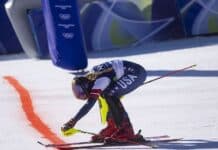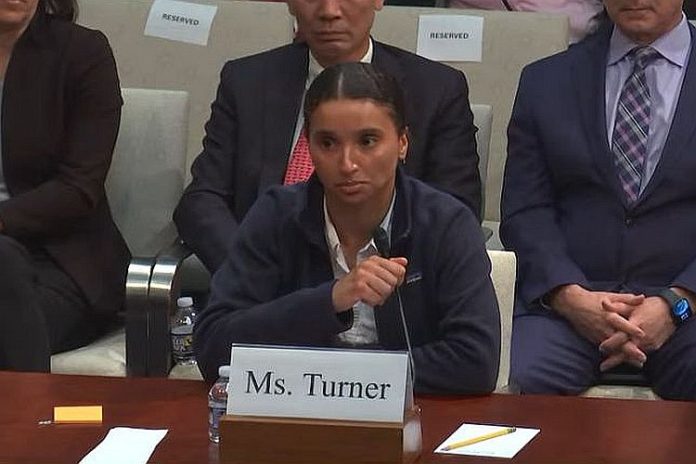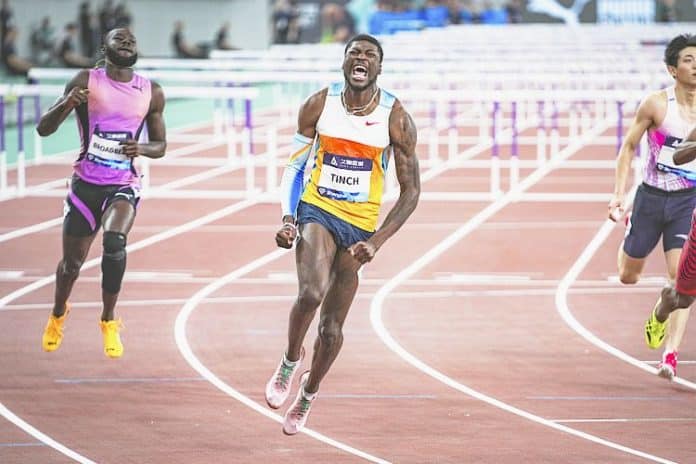★ The Sports Examiner: Chronicling the key competitive, economic and political forces shaping elite sport and the Olympic Movement.★
★ To get the daily Sports Examiner Recap by e-mail: sign up here! ★
≡ POLITICS & IGNORANCE ≡
As might have been expected in these aggressively divisive times, a hearing of the Delivering on Government Efficiency sub-committee of the House Committee on Oversight and Government Reform on the place of transgender men in to women’s sports degenerated into a three-hour name-calling exercise.
The Democrats in the hearing essentially held a campaign rally, with each rep calling the hearing a waste of time and railing against President Donald Trump, his policies and accusing Republicans of targeting all transgender people in the country.
Republicans snapped back in kind, but were a bit more interested in fencing, questioning USA Fencing Chair Damien Lehfeldt at some length about the federation’s policies and some of his own social-media posts, but also cracking back against what they viewed as Democratic support for biological men participating in the women’s division in sports.
The tone was set by Chair Marjorie Taylor Greene (R-Georgia), who noted in her opening remarks:
“USA Fencing makes a mockery out of women’s fencing, by allowing biological males to compete in its women’s fencing competitions.”
It got hotter from there, with Ranking Member Melanie Stansbury (D-New Mexico) stating that the hearing was simply “about spreading hate,” and then forced a roll-call vote on adjourning the hearing immediately (which lost on a party-line vote, 8-7). More pertinent to the actual issue were the statements of three of the four witnesses:
● Stephanie Turner, who was disqualified at the Cherry Blossom Open in Maryland in April for refusing to compete against transgender competitor Redmond Sullivan, spoke about her experience:
“The [U.S. Fencing Association, now USA Fencing] has over 200 self-declared members who identify as ‘transgender.’ Each time a man competes in the women’s category, with USFA’s support, it removes fair sport and takes opportunities from women. …
“Athleticism is powerful in fencing and works in equal parts with strategy and technique. It’s unbelievably demeaning to female fencers to put down the differences between men and women and any woman’s loss to a man as a ‘skill issue’ or that a woman simply needs to work harder.
“Within the USFA authoritative body, there is a culture of intimidation toward women which demands that we be silent when men enter our tournaments. A culture that includes public humiliation, doxxing, social ostracism, dismissal, and even threats. I went from avoiding tournaments with known male athletes to reaching out to news outlets to get this story known. The USFA up until my protest has been unresponsive to women’s demands for fair fencing and instead doubled down on efforts to promote male inclusion in the female category.”
She added that since her protest:
“Speaking out on this issue has made me a target for harassment and violence, as well as cost me friends. I have decided to step away from the sport I love, at least for now as well because the USFA has fostered an environment where I am unwelcome in my own category.
“It is culturally acceptable to bully and shame women who speak up for women. I should not have had to make this sacrifice. Women deserve to be treated fairly in sport. We deserve opportunities to train, compete and win in a women’s category set aside for women. We deserve this at the lowest levels of sport all the way through elite Olympic competition. I hope that by taking a stand and raising awareness of the misogyny in our sport, I can help ensure other women and girls do not have to take such risks to receive the most basic protections in sports.”
● Payton McNabb, a former high school volleyball player in North Carolina, received a brain injury in September 2022 while playing volleyball from a spike by a transgender male hitter that knocked her unconscious. She no longer plays sports and said she suffers from “severe headaches, balance issues, vision impairment” and more. She noted:
“It is completely aggravating because the injury I suffered was 100% avoidable — if only my rights as a female athlete had been more important than a man’s feelings.”
● USA Fencing Chair Lehfeldt’s testimony walked a fine line on the question of where the responsibility for its transgender policies lie:
“Although it was adopted before I joined the Board, USA Fencing’s transgender participation policy had that same goal. At the same time, USA Fencing recognizes that the subject of transgender participation is complex and requires consideration of the viewpoints of numerous stakeholders. At all times, considerations of safety and fairness are paramount.
“I understand that, in developing its transgender participation policy, USA Fencing took stock of those diverse viewpoints and considerations and that it examined the scientific research and literature. It drew on its long experience with mixed-gender competition, where men and women have safely and fairly competed against each other for decades. And it consulted the practices and policies of other [National Governing Bodies] as well as those of the International Olympic Committee (‘IOC’), the United States Olympic and Paralympic Committee (‘USOPC’), and fencing’s international federation (‘FIE’).
“The polices of the IOC, the USOPC, and the FIE were particularly important. As an NGB, USA Fencing is governed by the Ted Stevens Olympic and Amateur Sports Act. That law includes provisions that forbid NGBs like USA Fencing from adopting participation requirements that are more strict than the requirements of their sport’s international federation. Fencing’s international federation, the FIE, permits transgender participation, consistent with the IOC framework. As a result, USA Fencing understands that it cannot ban transgender participation without the risk of
violating the Ted Stevens Act.”
He also spoke directly to the issue of male physical advantages over women, saying there aren’t any:
“Ultimately, fencing is a sport of strategy and technique. More than anything else, those elements will most frequently determine who prevails. And when it comes to strategy and technique, neither sex has any inherent advantage. For that reason, among others, transgender status does not confer any inherent advantage over a cisgender fencer.
“Indeed, cisgender women have beaten transgender women in 55% of the bouts for which USA Fencing has data.”
As for the future:
“USA Fencing recognizes that transgender participation has been the subject of great debate in recent years. USA Fencing welcomes that discussion. There can never be too much conversation about how to make our sport better.
“And so, I want to be crystal clear—with both the Subcommittee and with our fencing community – that if the research or the international consensus concerning transgender participation changes, USA Fencing is prepared to amend its participation requirements to reflect those new realities. Similarly, USA Fencing will always abide by its governing statute, the Ted Stevens Act. If Congress amends that statute in ways that affect USA Fencing’s transgender participation policy, USA Fencing will of course amend its policies to ensure compliance.
“Indeed, USA Fencing has been proactive in this area. After months of discussion, USA Fencing recently adopted a contingent transgender participation policy that will go into effect if Congress amends the Ted Stevens Act to ban transgender participation. It will also take effect if the bodies that regulate fencing and Olympic-Paralympic competition – such as the FIE, the IOC, or the USOPC – amend their regulations to ban transgender participation.”
The fourth witness, National Women’s Law Center President Fatima Goss Graves, was added to the panel at the request of the Democrats, and provided testimony which came down to this:
“Anti-trans extremists who claim trans women and girls have an overwhelming advantage in women’s sports, or must be banned from sports to protect cis women from injury, are regurgitating tired, sexist tropes.”
The questions and answers which followed for a ponderous two hours and 25 minutes were mostly political posturing and shouting. However, Rep. William Timmons (R-South Carolina) told Lehfeldt:
“We’re going to fix this. You’re lagging behind us fixing it and what’s going to happen is we’re going to amend the Ted Stevens Act … you’re going to lose your Federal Charter, and I appreciate that you did adopt a contingent policy, but why do we have to do this?
“You’re really creating a problem where no problem should exist.”
Turner was asked later about the response of USA Fencing to complaints from members about its transgender policies:
“I have known of other members of USA Fencing, a mother and a daughter who came to USA Fencing, saying that they did not approve of the transgender policy and they were told that they would be sanctioned.”
As for her own future in the sport, Turner said:
“I don’t think I’ll ever get a fair bout again, from a referee, or that I’ll be welcomed without harassment.”
Observed: This was pathetic from many sides. No one knew the real details of what was being discussed, most notably that the FIE – the international federation – has no transgender policy, and that the IOC has none either, only recommendations to the IFs. So USA Fencing can do as it pleases, but no one knew enough to point to that.
Further, the USA Fencing rules on transgenders (reviewed on 7 May 2025) specify:
● “To participate in a USA Fencing-sanctioned event, athletes are to register with USA Fencing as the gender in which they identify and wish to compete during registration/renewal. Please note, this selection will be logistically binding and athletes will not be permitted to modify their gender during the season. If the athlete registers as a gender other than their gender associated with the sex assigned at birth, they should adhere to the the following requirements.”
● “Transgender female (MTF) athletes: Athletes being treated with testosterone suppression medication, for the purposes of USA Fencing-sanctioned competitions may continue to compete in men’s events, but may only compete in women’s events after completing one calendar year (12 months) of testosterone suppression treatment. Proof of compliant hormone therapy must be provided prior to competition.”
There is no language stating that transgender women – male to female – are required to be undergoing testosterone suppression, so in fact, any male fencer can – under the current rules – simply register to compete in women’s competitions.
Lehfeldt’s written testimony stated:
“In October 2022, USA Fencing ultimately adopted a transgender participation policy that closely tracked those of other NGBs. That policy allows transgender female fencers to compete in the division that corresponds with their gender identity assuming certain conditions are met.
“Chief among these conditions is that the transgender athlete has undergone hormone therapy for at least a year. USA Fencing requests medical documentation of such therapy and reviews that documentation before allowing transgender fencers to fence in a division that does not correspond to their sex assigned at birth.”
That’s nowhere in their posted transgender policy statement currently in force.
All of this may become moot if the IOC acts under new President Kirsty Coventry (ZIM), who has pledged to convene a panel after she takes office on 24 June to “protect the women’s category.”
In the meantime, the positions of U.S. National Governing Bodies are all over the place, with the larger federations such as athletics, aquatics, cycling and others adopting a very strict policy which essentially eliminates all transgender women who have entered male puberty. That is not where fencing is, but the studies on the subject are moving that way.
¶
★ Receive our exclusive, weekday TSX Recap by e-mail by clicking here.
★ Sign up a friend to receive the TSX Recap by clicking here.
★ Please consider a donation here to keep this site going.
For our updated, 694-event International Sports Calendar for 2025 and beyond, by date and by sport, click here!

























